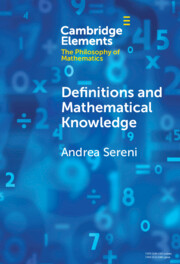Refine search
Actions for selected content:
2 results

Definitions and Mathematical Knowledge
-
- Published online:
- 05 December 2024
- Print publication:
- 16 January 2025
-
- Element
- Export citation
Chapter 13 - Concepts in Greek Mathematics
-
-
- Book:
- Conceptualising Concepts in Greek Philosophy
- Published online:
- 25 April 2024
- Print publication:
- 02 May 2024, pp 307-329
-
- Chapter
-
- You have access
- Open access
- HTML
- Export citation
